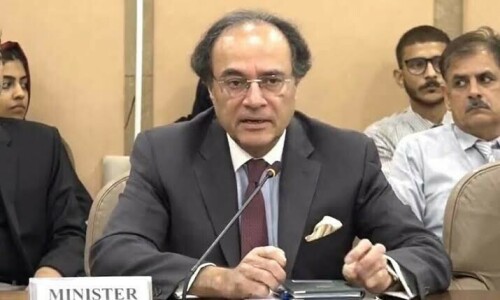Pakistan aims to raise up to $4 billion from Middle Eastern commercial banks by the next fiscal year, the State Bank of Pakistan (SBP)’s governor told Reuters on Tuesday, as the country looks to plug external financing gaps.
In a wide-ranging interview, his first with any media organisation since taking office in 2022, State Bank of Pakistan Governor Jameel Ahmad said Pakistan was also in the “advanced stages” of securing $2 billion in additional external financing required for International Monetary Fund (IMF) approval of a $7 billion bailout programme.
Pakistan and the IMF reached an agreement on the loan program in July, subject to approval from the IMF’s executive board and the country obtaining “timely confirmation of necessary financing assurances from Pakistan’s development and bilateral partners”.
Asked about monetary policy, Ahmad said recent interest rate cuts in Pakistan have had the desired effect, with inflation continuing to slow and the current account remaining under control, despite the cuts.
Pakistan’s annual consumer price index inflation was 11.1 per cent in July, having fallen from highs of over 30pc in 2023.
“The Monetary Policy Committee will review all these developments,” Ahmad said, adding that future rate decisions could not be pre-determined.
Pakistan’s central bank cut rates for two straight meetings from a historic high of 22pc to 19.5pc, and will meet again to review monetary policy on September 12.
“Now we have to focus on growth and other related areas because those are also equally important for job creation and other socioeconomic issues,” said Ahmad.
He added that the central bank’s mandate was to ensure price and financial stability before shifting its focus towards growth.
Previously, it was reported that the country was in talks with Middle Eastern banks to secure about $4 billion in loans required to meet external financial needs during the current fiscal year.
For the current fiscal year, Pakistan has pitched about $20bn in foreign borrowing in the budget, besides another $3bn rollover from the UAE that was reported separately for the balance of payments. With this much borrowing, Pakistan’s reserves were estimated to grow to about $19-20bn by the end of the current fiscal year.
Of the $20bn estimate, about $4bn is again targeted to be arranged through foreign commercial borrowing during the current fiscal year and another $1bn in international bonds.














































Dear visitor, the comments section is undergoing an overhaul and will return soon.